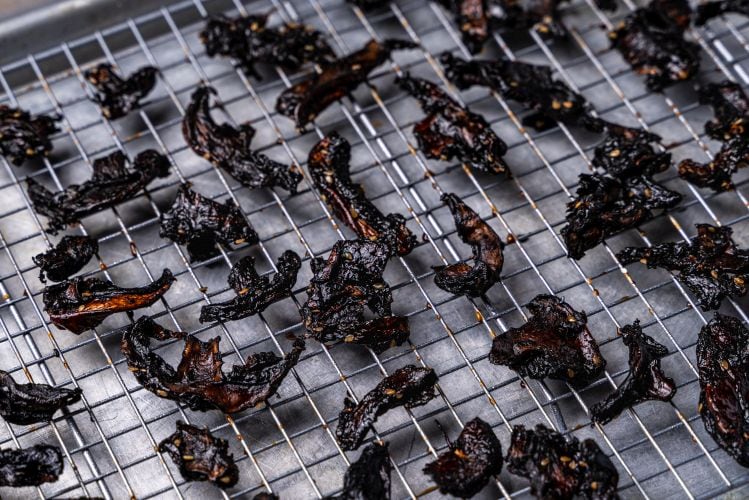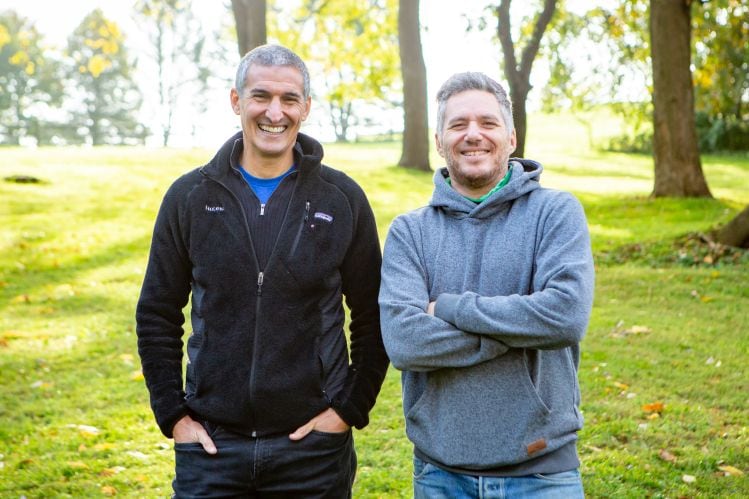And when it comes to sustainability, there is a clear opportunity for food companies to step up, argues Goldman, who stepped down as executive chairman of Beyond Meat earlier this year (he still chairs the board) in order to focus on MD-based Eat the Change, co-founded with chef Spike Mendelsohn.
While consumers can feel helpless in the face of a global threat such as climate change, the one thing they can do is change their diet, says Goldman, whether it’s replacing some animal-based products with plant- or fungi-based alternatives to reduce GHG emissions or water use (he recently co-founded the PLNT Burger restaurant chain), or buying products from companies that are investing in more sustainable packaging.
‘What we hope is that Eat the Change will serve both as a brand and as a call to action,” adds Goldman, who has just completed a $5m raise from angel investors to launch his new endeavor.
“You only get to vote every two or four years, but you eat three times a day.”
Fungi… the third branch of life
The first product to launch under the Eat the Change brand – currently available via eatthechange.com and hitting multiple retail stores and other online platforms next year - is an organic mushroom jerky made with portobello and crimini mushrooms sourced from a family farm in Kennett Square, PA, which on the face of it might look like a niche category to play in.
Not so, argues Goldman, who says fungi (neither animals nor plants, but the ‘third branch of life’) are attracting interest both from a nutritional perspective (lion’s mane, reishi, cordyceps, chaga), but also as a key pillar in the sustainable food production, whether it’s growing mycelium to produce next-generation meat alternatives (Atlast Foods, Meati Foods); growing ‘extremophiles’ for a new wave of fungi-based foods (Nature’s Fynd); growing mycelium to ferment plant proteins (MycoTechnology); using fungi for precision fermentation (Perfect Day); or developing more culinary-inspired mushroom-based snacks or other products.
“There’s a mushroom renaissance that’s happening for sure, and there’s also growing interest in mushrooms and immunity.”
He adds: “I would never aspire to be just the best-selling vegan mushroom jerky; when I launch anything it’s always with a much bigger sense of what the opportunity is.”
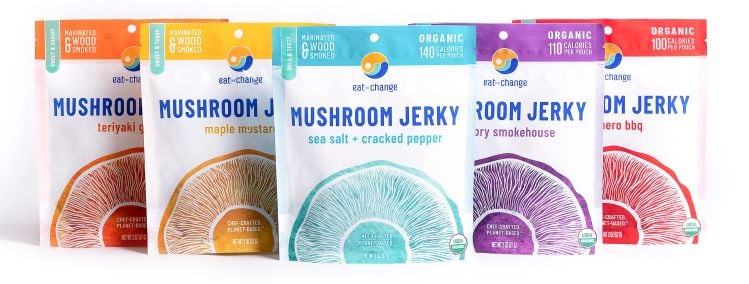
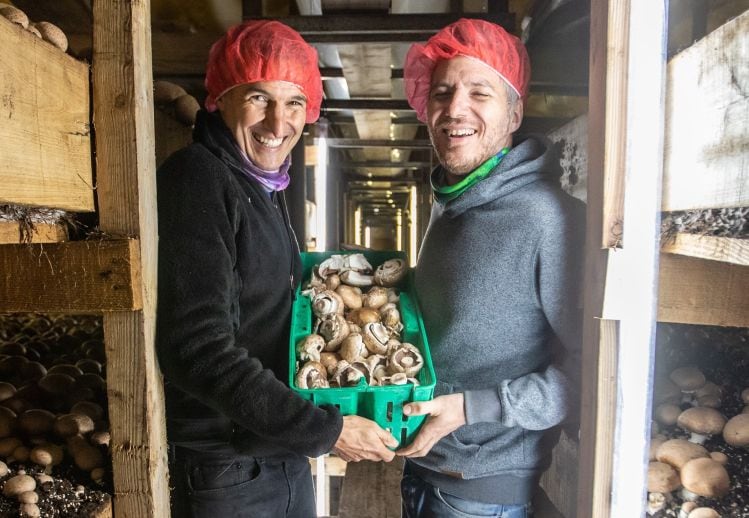
‘Mushrooms are such a great blank canvas’
And while mushroom jerky is just the first in a series of products in the pipeline, he says, “It’s a really great place to start; mushrooms are such a great blank canvas for a chef where you can add such incredible flavor.”
There are several vegan jerky brands on the market today using soy or wheat protein as a base - although peas, faba beans and seaweed-based products are also available now along with a few other mushroom-based products - says Goldman. However, Eat the Change is “avoiding the six crops [sugar cane, corn, rice, wheat, potatoes, soybeans] that account for over 57% of all crop production by weight,” he says.
“Our jerky is also minimally processed, only going through a marinating and smoking process before being packaged. It’s mushrooms, they haven’t been extruded, pulverized or extracted.”
The product – which has 2-3g protein per serving (less than meat-based jerky) - is “not a protein play,” says Goldman. “Rather than competing directly with beef jerky, it’s just expanding what jerky is. There are also some B vitamins in there that are not commonly found even in many plant-based foods.”
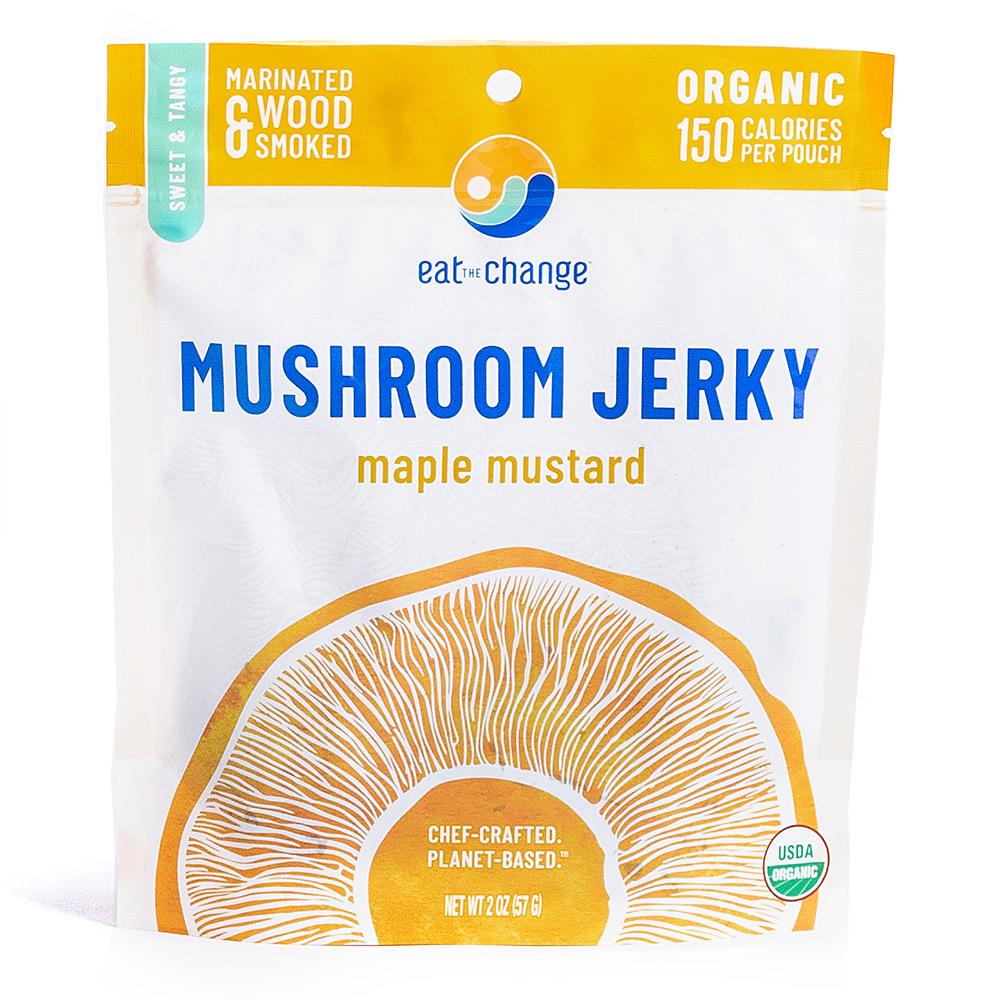
Ingredients (maple mustard flavor):
Organic Crimini and Portobello mushrooms, organic maple syrup, organic apple cider vinegar, organic tapioca syrup, organic mustard powder, organic agave syrup, organic sunflower oil, sea salt, organic mustard seeds, organic turmeric, organic flavor, organic paprika, organic tara gum.
Launching in a pandemic
So what has it been like launching a new product in the middle of a pandemic, when trade shows, demos, sampling and other traditional tools for driving consumer and trade awareness are off the menu, and some retailers have been reluctant to take on new brands?
“The traditional playbook that has served brands like Honest Tea [a brand Goldman co-founded in 1998 and sold to Coca-Cola in 2011] very well,” has been thrown out in 2020, he says, with digital marketing and e-commerce moving higher up the agenda.
“We’re much more engaged in social media.”
As for e-commerce, meanwhile, it’s a lot cheaper and easier to ship jerky than some other products he’s worked with (meat alternatives, bottled beverages), he points out, although bricks & mortar retail channels will still feature heavily in the go-to-market strategy.
Pandemic shopping: 'It’s not a foraging visit anymore, it’s a checklist visit'
The challenge right now for new brands launching in in bricks & mortar accounts is finding ways of grabbing consumers’ attention at a time when they are much more goal-oriented (write a list, get in, get out), not the perfect mindset for discovering new brands, he says.
“Buyers know they need to refresh their shelves, but a lot of consumers have been retrained away from discovering brands in store, because it’s not a foraging visit anymore, it’s a checklist visit, so we have to take extra steps to disrupt and grab their attention, so we’ve been talking to some retailers about maybe putting a clip strip next to kombucha, or in what used to the salad bar.”
COVID-19 and the food system
As for the impact of COVID-19 on the food system, while conventional meat sales have been pretty robust despite some supply chain challenges, the pandemic has raised questions about the role of industrialized animal agriculture in the spread of animal and human pandemics, he claims.
It has also shone a light on working conditions in meat packing plants, which became COVID-19 hotspots given how closely packed workers are.
“The meat industry and the fossil fuel industry will continue to exist, but I hope that consumers can understand that they can play a role in climate change. It’s not only for the government to address, it’s something all of us can address, whether it’s eating less meat or more upcycled foods, or reducing food waste.”
Through its impact grant program, Eat the Change is investing in innovative nonprofits working to promote and expand access to climate-friendly foods, awarding $340,000 to 32 inspiring Changemakers operating at the national and community level.
